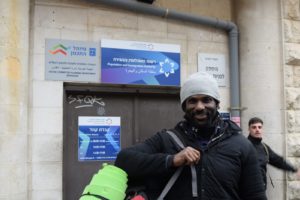
David Ben Moshe, a Baltimore native, has been trying to become an Israeli citizen for over three years now.
On Jan. 3, he began a hunger strike in front of the Ministry of the Interior office in Jerusalem that he said would not end until he was given a teudat oleh (immigrant’s card). On Jan. 11, he ended the hunger strike in response to a written guarantee he would receive his aliyah status on Jan. 1, 2023, he wrote in a Facebook post.
Ben Moshe, who converted to Judaism, originally moved from Maryland to Israel about four years ago because he wanted to make aliyah. Since moving to the country, he has married an Israeli Jewish woman and started a family. He submitted his application for citizenship in May of 2018.
According to Ben Moshe, part of the problem has been his criminal record. In 2010, when he still lived in Maryland, Ben Moshe was arrested and convicted of drug and firearms charges and was sentenced to 30 months in prison. The Law of Return gives Jews the right to immigrate to Israel and become Israeli citizens, but there is an exception that bars “a person with a criminal past, likely to endanger public welfare,” according to the Knesset website.
However, Ben Moshe said he doesn’t believe he meets this stipulation as he doesn’t endanger public welfare.
He was released early from his sentence on probation for good behavior and then went on to work for the Baltimore Police Department. He has also done a lot of volunteer work with special needs children.
“I’ve done everything that you would want from a model citizen after I was released,” Ben Moshe said.
There is no exact definition on what is considered a “criminal past” or what the qualifications are for someone to “endanger public welfare” in the Law of Return, so it is up to interpretation.
“The Law provides that determining the nature of the security threat or the seriousness of the crime remains at the discretion of the Minister of Interior (or a subordinate to whom this authority was delegated),” said Elad Strohmayer, spokesperson of the Embassy of Israel to the USA.
This also applies to determining “whether a certain criminal record may reflect a future threat to the public peace,” Strohmayer said.
Additionally, Ben Moshe converted to Judaism after being released from prison, since he enjoyed learning how to read Torah while serving his sentence. He believes his conversion has also made his immigration to Israel difficult.
The Law of Return states, “for the purposes of this Law, ‘Jew’ means a person who was born of a Jewish mother or has become converted to Judaism.”
Jews who have converted are eligible under the law, but Ben Moshe and his lawyer Rabbi Seth Farber state that the fact that he was not born a Jew has been making the process harder.
“Conversions are subjected to the kind of scrutiny that doesn’t respect the journey people have gone through,” Farber said.
In addition, another struggle that Ben Moshe has been facing is navigating the Israeli bureaucracy.
Farber said that there has been a lot of miscommunication between Ben Moshe and the Ministry of Interior, since they did give him a timeline, but they did not communicate the specifics of it effectively. He said that Ben Moshe is a “victim of bureaucracy.”
Ben Moshe has said that his primary motivation for gaining Israeli citizenship is supporting his family, which is one way he will be a “model citizen” in Israel.
“The number one goal is to raise a family with a lot of kids, take care of my wife and be a good husband and father,” Ben Moshe said.








What is wrong with you brother, just another VICTIM. That BS.